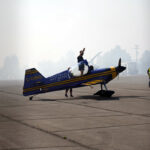Home »

Check immunization records before spring break travel
With measles outbreaks being reported internationally and spring break on the horizon, the provincial health officer, BC Centre for Disease Control and public health officials are reminding people in British Columbia to check their vaccination records before travelling to ensure they are protected.
In B.C., measles vaccine is given as a series of two doses. The first dose is given as the measles, mumps and rubella (MMR) vaccine on a child’s first birthday and the second dose is given around the time of starting school as the measles, mumps, rubella and varicella (MMRV) vaccine.
Babies as young as six months should get vaccinated against measles before travelling to countries where measles is spreading. Children between one and four years can also get their second dose before travelling internationally, the health agencies said.
Vaccine appointments can be booked through local public health units, community health centres or nursing stations.
Some primary-care providers and travel clinics also offer vaccinations. It is recommended to call in advance to check if the measles vaccine is available. Children four years or older, as well as adults, can also be vaccinated by a pharmacist. If it is the child’s first dose, it is best to get immunized at least two weeks before travel to give the child’s body time to build immunity.
Adults may already have protection from childhood vaccination or from having measles. Measles vaccines are typically not needed for those born before 1970 as most people in that age group have immunity to measles from a prior infection, before vaccination was widely available.
However, before international travel, adults should ensure they have received two doses of a measles-containing vaccine if they were born in 1970 or later.
One case of measles was reported over the weekend in B.C. At least nine cases of measles have been reported in Canada so far in 2024 outside of B.C. as of Feb. 29, 2024.
Most of these cases were in people who were not immunized or not fully immunized, and who travelled to countries where measles is spreading. There were 12 cases reported in 2023.
Globally, cases are rising due to a decline in measles vaccinations that occurred during the COVID-19 pandemic. The World Health Organization (WHO) reported a 79% increase in the number of global measles cases in 2023, compared to 2022.
Measles is a highly contagious virus that can spread through air. People can pass the virus to others before they show symptoms and the virus can stay suspended in the air in a room for several hours. That is why protection by immunization is so important. People who are most at risk from measles are those who are completely unvaccinated against the disease and have not had measles.
Prior to the case of measles reported over the weekend, the last case of measles was reported in B.C. in 2019, during a time of a global increase in measles activity, with cases originating from travel outside of Canada.
Measles can spread quickly in school settings, and following a single case of measles in a school, children who are not immunized or not fully immunized are offered vaccine or excluded from school.
Parents and caregivers should check that their child’s immunization records are up to date in the Provincial Immunization Registry and submit any missing immunization records to the registry. This will prevent children from missing school in the event of a measles case.
Health authorities are offering vaccine opportunities in advance of spring break.
Learn more about clinics or where to call for more information in Interior Health.
Interior Health image
e-KNOW







